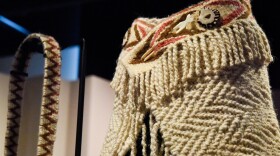The award-winning book A Desert Between Two Seas: A Novel in Stories is a mythic tale set amid crumbling Spanish missions in 19th century Baja California, Mexico.
Published in September, it's the first book of Skagit County writer Amy Muia, who researched the project for more than a decade.
When Muia started the writing process, she planned a traditional novel that would follow a single story with a beginning, middle and end. But it didn’t turn out that way.
"I set down the first story, which I was pretty pleased with, and everything after that was just awful," Muia said. "The characters were cardboard, the plot was contrived, and nothing was working out at all. And then a writer friend said, ‘Hey, why don't you try writing some short stories?’ And I was really resistant, actually, to that idea."
She saw short stories as a form of practice for writers who wanted to become novelists, but she decided to try to develop the book one short story at a time, with a few characters re-appearing several times throughout the collection.
“I thought, ‘Well, what do I have to lose?’ Because nothing that I'm doing is working,” Muia said.
Among her characters is a well-meaning priest who causes a boy to drown and then "abandons his call,” she said. Another is a woman who, cast off by a father she loves, is seeking to return to him but is "caught up in a moment of violence.”

In an interview with KNKX, Muia said delving deeper into the internal struggles of the characters in her book is something that she grappled with. While creative writing has been a joy for much of her life, she was never comfortable with putting her own feelings on paper.
Muia will take part in a reading and book signing at Little Mountain Books & Botanica in Mount Vernon on Sunday, Nov. 16 at 3:30 p.m.
Interview Highlights
On expressing herself through characters
I think what I've done is I've wrapped up those questions and wrestlings in fictional characters. And so some of those questions in this book that I was wrestling with were: Why do we as human beings struggle so much to receive love? When we long for love? Why do we push it away when it comes? And why do we struggle so much to receive forgiveness? Why do we keep beating ourselves up over the things that we've done? So somehow all of those questions ended up in a novel about 19th century Baja California, Mexico.
On what she learned in Baja California
It involved a lot of — at home — reading a lot of dusty old books about mission history, and pouring over old maps and pouring over modern maps and trying to locate these historic places on these maps. And then going to Baja California and interviewing these Californios, these ranchers and their families who are descendants of the soldiers and settlers who were connected to the missions. And they still live in very traditional ways.
On winning the Flannery O’Connor Award for Short Fiction
It really seeks to honor the form of the short story. And of course, we know that [Flannery O'Connor] was a master at that. She wrote in very straightforward prose about unlikable people without any hint of romanticizing them whatsoever. So the winners of the Flannery award, they don't necessarily have to write or sound like Flannery O'Connor, but I would like to think that there is a little bit of Flannery O'Connor in my work. She liked to write about outcasts, and so do I.
On pursuing writing as reading declines
I've thought about this a lot. The conventional wisdom is that we've all ruined our attention spans by scrolling on our phones and constant dopamine hits from all of the sound bites and things that we're consuming all day long. And we know theoretically that this is bad for us. People have told me "I had to slow down in order to read your book," and I'm really glad about that. I hope that people will start to find life by picking up a physical book and by slowing down and by letting the words come into their hearts and permeate them and stay with them and sink in. Technology can't do that for us and AI-written books can't do that for us.







